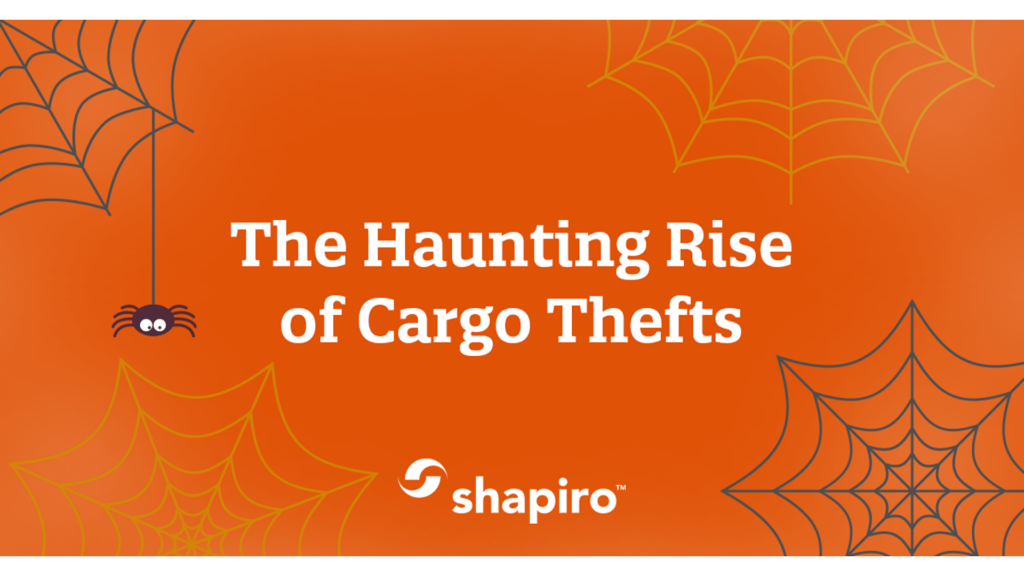The Haunting Rise of Cargo Thefts

In a world already fraught with frightening freight challenges, shippers are now grappling with a bone-chilling new threat that haunts their every waking moment—a rising number of cargo thefts. Statistics reveal a total of 566 incidents documented this year, marking a spine-tingling 56% year-over-year increase. These thieves, driven by an insatiable appetite for cash, target a wide array of commodities, ranging from high-end electronics to essential construction materials and coveted sneakers, akin to a wicked assortment of Halloween candy. The startling reality is that these robberies have amassed a staggering total value of over $40 million, at an average of $260,000 per theft.
But these spectral criminals aren’t content with lurking in the shadows; they’ve established their ghoulish dominion near bustling hubs and cities. Among these locales, California and Georgia have emerged as the principal settings for this spooky saga. In an audacious display, some of these larcenists are causing entire truckloads to vanish. They are orchestrating fake pick-ups with unsuspecting drivers, leaving only a ghost behind in their wake.
Most of the purloined goods find their way to the darkest corners of the black market, fetching a mere 15-20% of their actual value. However, certain items, such as electronics and high-demand shoes, are stealthily maneuvered onto online platforms like eBay and Facebook Marketplace, often fetching prices that equal or even exceed their MSRP.
The Environmental Skeletons in the Global Closet
We guess you may have read about global warming or watched a docile tropical storm rage into a Class 5 hurricane in a day, or maybe you have floated into your own backyard on your sofa. Call it what your political party insists, but there should be a skull-and-crossbones warning label on much of our planet.
Your cargo has never been haunted by so many potential ghouls along the treacherous path of your supply chain. Forty percent of global ports (those that handle 60% of the world’s cargo) are already in potential jeopardy from rising water levels. Vessels and aircraft have never faced choppier seas or more violent turbulence. Floods, typhoons, droughts, hurricanes, fires, and witches all lurk, and many companies just aren’t even close to ready.
Like a giant Jack-o-Lantern, complete with a crooked grinning jaw, the Earth is laughing at your vulnerable cargo and your skimpy property policy. Yes, the one that “claims” to cover cargo claims!
Ward Away the Shadows with Cargo Insurance
Fear not, for there’s a solution to ward off the impacts of these sinister spirits: cargo insurance. There are many benefits to cargo insurance. Here are a few examples:
- Financial Safeguard: Cargo insurance serves as a safeguard for your investments, creating a protective barrier that shields you from potential financial issues in the event of theft or damage during transit.
- Risk Mitigation: Insurance can give you peace of mind in moving expensive or large shipments. If something does happen to the cargo, the risk is mitigated in terms of realized losses.
- Operational Continuity: Having cargo insurance in place for a shipment expedites the claims process, ensuring that losses are recovered swiftly. This reduced processing time helps to minimize operational disruptions since new goods can be on their way more quickly.
- Competitive Advantage: It is more than just protection; it is a statement of professionalism in the world of international trade. Your clients and partners will view your business as responsible and reliable.
What Goes in this Perfect Potion?
Things to consider when choosing cargo insurance:
- Coverage Scope: When selecting cargo insurance, it’s imperative to ascertain that the policy is tailored to your unique risks. For example, if you’re importing delicate porcelain china, your policy should explicitly cover damage due to handling or breaking during transit.
- Policy Limits: Review the limits of coverage to ensure they align with the value of your cargo. The coverage should reflect the true value of your shipments.
- Deductibles: Be aware of the deductibles you’d be responsible for in case a claim is made. Knowing the deductible amount is crucial, as it directly impacts the out-of-pocket expense in case of a claim.
- Claims Process: Investigate the ease and efficiency of the claims process with your chosen insurance provider. If you’re importing perishable goods, a swift and straightforward claims process is vital, as delays could result in significant losses.
- Customization: Look for cargo insurance policies that can be customized to suit your specific requirements around handling, transportation, etc.
To safeguard your imports and ensure the continuity of your operations, cargo insurance is an indispensable tool, especially with thefts on the rise. By choosing the right policy, you can protect your investments, mitigate risks, and gain peace of mind. If you’d like assistance in obtaining cargo insurance, book an appointment with our logistics experts today!
